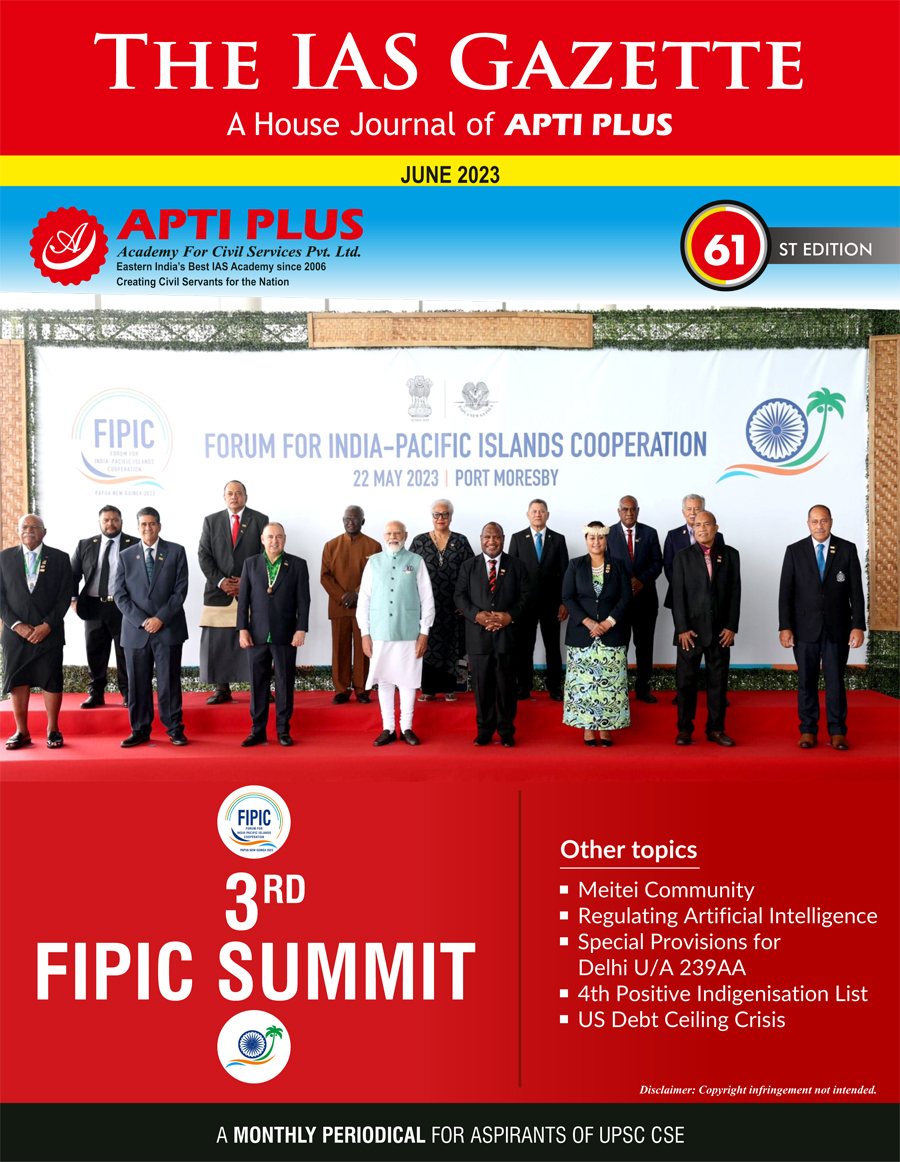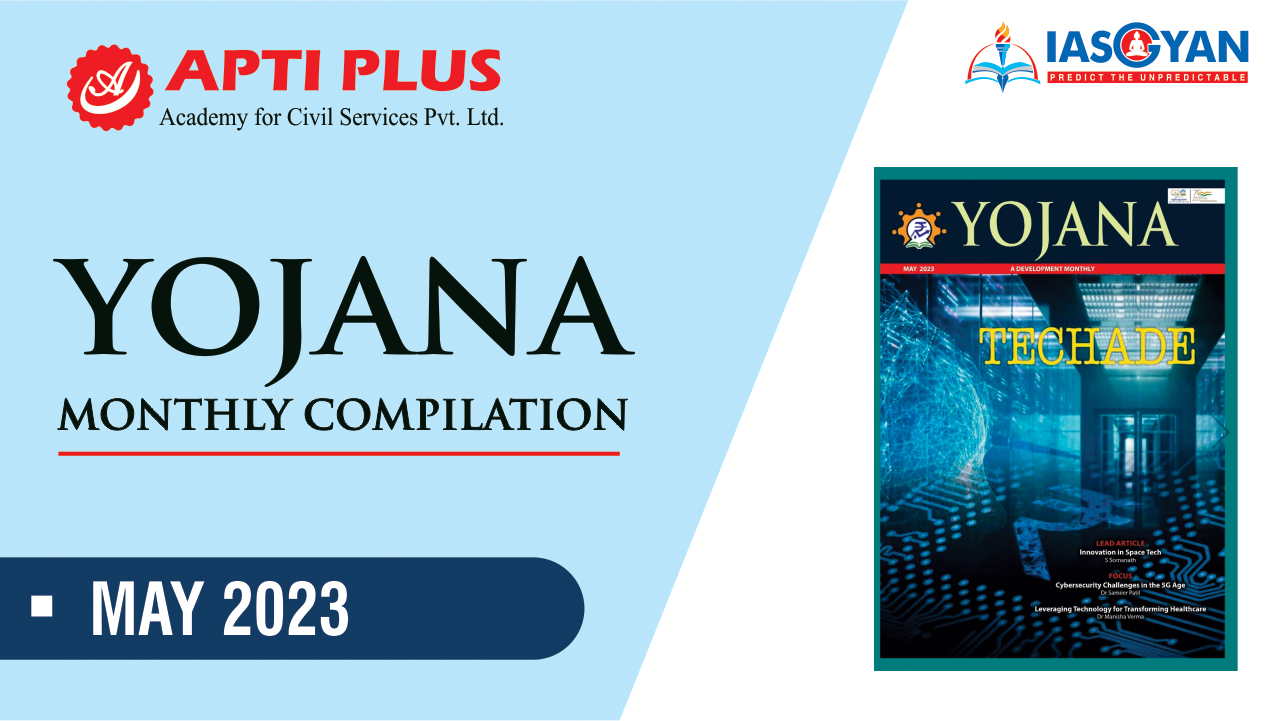
Copyright infringement not intended
Context: On the occasion of International MSME Day, the Ministry of Micro, Small & Medium Enterprises (MSME) is celebrating ‘Udyami Bharat-MSME Day’ on 27th June 2023 at Vigyan Bhawan, New Delhi.
Details
- During this programme, the Ministry of MSME has launched various initiatives for the growth and development of MSMEs such as the CHAMPIONS 2.0 Portal and Mobile App for Geo-tagging of Cluster Projects and Technology Centers.
- During the programme results for 'MSME Idea Hackathon 2.0' was declared and 'MSME Idea Hackathon 3.0' for Women Entrepreneurs was launched.

MSME Sector
About
- The Micro, Small and Medium Enterprises (MSME) Sector is a vital part of the Indian economy. It contributes to the country's GDP, exports, employment and inclusive growth.
Background of the MSME Sector
- The MSME sector has its roots in the traditional and cottage industries that existed before independence. These industries were mainly based on local resources, skills and markets. They provided livelihood to millions of artisans and workers across the country.
- After independence, the government recognized the importance of these industries and enacted various policies and schemes to support them.
Some of the notable initiatives were
- The Khadi and Village Industries Commission (KVIC) was established in 1956 to promote khadi and village industries.
- The Coir Board was set up in 1953 to develop and regulate the Coir industry.
- The Micro, Small and Medium Enterprises Development (MSMED) Act was passed in 2006 to provide a legal framework for the definition and development of MSMEs.
- The Ministry of Micro, Small and Medium Enterprises (MoMSME) was formed in 2007 to coordinate and implement various programmes and schemes for MSMEs.
Features of the MSME Sector
- It covers a wide range of activities, such as manufacturing, services, trade, agriculture and allied sectors.
- It is based on low capital investment and high labour intensity.
- It is flexible and adaptable to changing market conditions and customer preferences.
- It is innovative and entrepreneurial in nature.
- It is dispersed across rural and urban areas, creating regional balance and reducing regional disparities.
Significance of the MSME Sector
- It contributes to nearly 29% of the GDP and 40% of the exports.
- It employs about 110 million people, making it the second largest source of employment after agriculture.
- It acts as a nursery for entrepreneurship and innovation, creating new products and services.
- It supports large-scale industries by providing them with raw materials, components and ancillary services.
- It promotes inclusive growth by providing employment opportunities to the marginalized sections of society, especially women, SCs/STs and minorities.
- It fosters social harmony by preserving and promoting the cultural heritage and diversity of India.
Despite its importance, the MSME sector faces several challenges that hamper its growth and competitiveness.
Challenges Faced by MSME Sector
Lack of access to adequate finance
- MSMEs often face difficulties in obtaining timely and affordable credit from formal sources due to high-interest rates, collateral requirements, complex procedures and documentation. They also face problems in raising equity capital from angel investors, venture capitalists or public markets.
Lack of access to modern technology
- MSMEs lag in adopting new technologies that can improve their productivity, quality and efficiency. They face barriers such as the high cost of technology acquisition, lack of awareness, lack of skilled manpower and lack of technical support.
Lack of access to the market
- MSMEs face stiff competition from domestic and foreign players in the market. They face challenges such as low brand recognition, lack of marketing skills, lack of market information and lack of quality standards.
Lack of infrastructure
- MSMEs suffer from poor infrastructure facilities such as power, water, transport, communication and logistics. They also face problems such as inadequate industrial clusters, common facility centres and incubation centres.
Lack of policy support
- MSMEs face regulatory hurdles such as multiple registrations, licenses, permits, inspections and taxes. They also face policy gaps such as a lack of coordination among various ministries and departments, a lack of effective implementation of schemes and programmes and a lack of grievance redressal mechanisms.
The Government has taken various initiatives to support MSMEs
- Pradhan Mantri Mudra Yojana: A scheme to provide loans up to Rs. 10 lahks to micro and small enterprises without collateral or guarantee.
- Credit Guarantee Fund Trust for Micro and Small Enterprises: A scheme to provide credit guarantees to banks and financial institutions for loans up to Rs. 2 crores to micro and small enterprises without collateral or third-party guarantee.
- Udyog Aadhaar Memorandum: A scheme to simplify the registration process for MSMEs by using a single online form and a unique identification number.
- MSME Samadhaan Portal: A portal to enable MSMEs to file their delayed payment cases against buyers and get them resolved in a timely manner.
- Atmanirbhar Bharat Abhiyan: A package of Rs. 20 lakh crore was announced by the government in May 2020 to provide relief and stimulus to various sectors of the economy, including MSMEs, amid the COVID-19 pandemic.
- Emergency Credit Line Guarantee Scheme: A scheme to provide collateral-free loans up to Rs. 3 lakh crore to MSMEs and other eligible borrowers affected by the COVID-19 pandemic, with a 100% guarantee from the government.
- Fund of Funds for MSMEs: A scheme to create a fund of Rs. 10,000 crores that will invest in equity and quasi-equity instruments of MSMEs with growth potential and viability.
- Champions Portal: A portal to provide a one-stop solution for MSMEs to access various schemes, services, grievances redressal, etc., from the government and other stakeholders.
- Make in India: A flagship initiative launched by the government to promote manufacturing in India and boost its global competitiveness.
- Startup India: Flagship initiatives launched by the government to foster entrepreneurship and innovation in India and create a conducive ecosystem for startups.
- Standup India: A flagship initiative launched by the government to facilitate bank loans between Rs. 10 lahks and Rs. 1 crore to at least one scheduled caste or scheduled tribe borrower and at least one woman borrower per bank branch for setting up greenfield enterprises in the manufacturing, services or trading sectors.
- Digital India: A flagship initiative launched by the government to transform India into a digitally empowered society and knowledge economy by providing digital infrastructure, services, literacy, etc.
Way Forward for MSME Sector
Enhance access to finance
- The government should facilitate easier access to finance for MSMEs by simplifying procedures, reducing interest rates, increasing collateral-free loans, expanding credit guarantee schemes, promoting alternative sources of finance such as microfinance institutions (MFIs), self-help groups (SHGs), non-banking financial companies (NBFCs), peer-to-peer lending platforms etc., creating a dedicated fund for MSMEs under SIDBI or NABARD, and encouraging financial inclusion and literacy among MSMEs.
Enhance access to technology
- The government should facilitate easier access to technology for MSMEs by providing subsidies, incentives, tax benefits, grants etc. for technology adoption, creating technology centres, innovation hubs, incubators, accelerators etc. for technology development and diffusion, promoting public-private partnerships (PPPs) for technology transfer and collaboration, creating a digital platform for MSMEs to access information, knowledge and best practices on technology, and enhancing the skill development and training of MSMEs on technology.
Enhance access to market
- The government should facilitate easier access to the market for MSMEs by creating a national portal for MSMEs to showcase their products and services, providing marketing assistance, branding support, quality certification, export promotion etc. for MSMEs, creating clusters, networks, consortia etc. for MSMEs to leverage economies of scale and scope, creating special economic zones (SEZs), industrial parks, corridors etc. for MSMEs to access infrastructure and incentives, and integrating MSMEs with global value chains and e-commerce platforms.
Enhance infrastructure
- The government should enhance the infrastructure for MSMEs by improving the availability and quality of power, water, transport, communication and logistics facilities, creating common facility centres (CFCs), tool rooms, testing labs etc. for MSMEs to access shared resources and services, creating industrial estates, growth centres etc. for MSMEs to access land and other amenities, and creating green and smart infrastructure for MSMEs to reduce environmental impact and improve efficiency.
Enhance policy support
- The government should enhance the policy support for MSMEs by simplifying the regulatory framework, reducing the compliance burden, rationalizing the tax structure, streamlining the subsidy mechanism etc. for MSMEs, creating a single-window system for MSMEs to access various schemes and programmes of the government, creating a dedicated ministry or department for MSMEs to coordinate and monitor various policies and initiatives for MSMEs, creating a national council or commission for MSMEs to advise and consult the government on various issues and challenges faced by MSMEs, and creating a grievance redressal mechanism for MSMEs to resolve their problems and disputes

Conclusion
- The MSME sector is a vital force for the economic and social development of India. It has immense potential to contribute to the country's growth, employment, exports and inclusiveness. However, it faces several challenges that need to be addressed urgently. The government should adopt a holistic approach to support the MSME sector by enhancing its access to finance, technology, market, infrastructure and policy support. This will enable the MSME sector to overcome its constraints and achieve its full potential.
Must Read Articles:
MSME SECTOR: https://www.iasgyan.in/daily-current-affairs/msme-sector-14
https://pib.gov.in/PressReleaseIframePage.aspx?PRID=1934952#:~:text=The%20Ministry%20emphasizes%20on%20creating,of%20MSMEs%20across%20the%20country.&text=by%20PIB%20Delhi-,On%20the%20occasion%20of%20International%20MSME%20Day%2C%20Ministry%20of%20MSME,at%20Vigyan%20Bhawan%2C%20New%20Delhi




